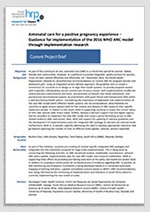A global study of men and women’s male contraceptive knowledge, attitudes, and behaviors using mixed methods

Overview
While the development and distribution of numerous contraceptive modalities has empowered women to plan and prevent pregnancies, the rate of unintended pregnancy remains high and family planning remains largely a women’s issue. While many men believe that preventing an unintended pregnancy is a shared responsibility, the burden of contraception will continue to be borne by their female partners until new male contraceptives (MCs) are developed. Fortunately, new MCs are in human clinical trials, with anticipation of marketing within the next 10 years. However, controversy persists regarding whether men would use new MCs and how these methods might influence the contraceptive behaviors of female partners. In preparation for the introduction of new MCs, the WHO Global Study on Male Contraception (WHO GSMC) examines current male contraceptive behaviors and explores associated socio-demographic, reproductive, and ideologic factors that may predict future willingness to use new MCs. The WHO-GSMC will contrast the characteristics and attitudes of contraceptive seeking versus non-seeking populations across 5 countries, selected for their diversity with respect to country-level income, gender equity, and unmet need for contraception. The WHO GSMC contributes to the attainment of SDG target 5 of achieving gender equality and empowering women and girls by envisioning family planning as a shared responsibility, made possible by use of MCs.
